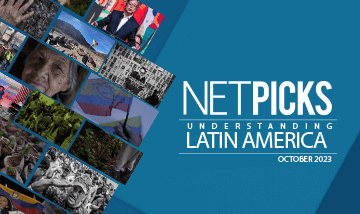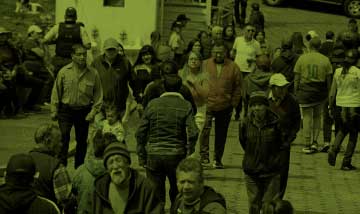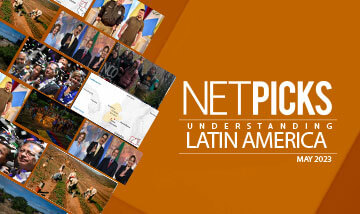Índice
- AN UNCERTAIN WAY FORWARD FOR PERU
- COLOMBIA’S ONGOING VIOLENCE HAS SHIFTED TRUTH AND RECONCILIATION FROM THE PAST INTO THE PRESENT
- FEMICIDE: THE MAIN CAUSE OF DEATH FOR VENEZUELAN WOMEN IN COLOMBIA
- ARE MEXICAN AVOCADOS THE WORLD’S NEW CONFLICT COMMODITY?
- BOLSONARO’S NEW ALLIANCE FOR BRAZIL IS A LESSON IN THE POLITICS OF LOYALTY AND CAMPAIGN FINANCE
Understanding Latin America
Every month we trawl the web for in-depth analysis, research summaries and opinions we think particularly worth reading, and that you won’t find in the mainstream media.
This month we bring you five articles: one from Peru, where the political situation remains unclear after the January Congressional elections; two from Colombia, where the transitional justice system continues to plough a new furrow despite the continuing violence, and on the lethal consequences of migration for Venezuelan women in this country; from Mexico on avocadoes and the link between the extremely popular fruit and criminal gangs; and finally, the apparently risky venture of Brazilian President Jair Bolsonaro in trying to establish his own party in time for the country’s municipal elections.
AN UNCERTAIN WAY FORWARD FOR PERU
Peru has been under the spell of Alberto Fujimori for 30 years. Despite spending much of the last decade in jail, he and his daughter Keiko have continued to wield enormous influence though the presence of their political party, Fuerza Popular, in the National Congress; in the 2016 elections the party won a record 73 of 130 seats. That influence was finally broken on the 26th of January. In the elections called after President Martin Vizcarra dissolved parliament, Fuerza Popular won only 15 seats in what is the most plural Congress in Peru for many years. The major part of the vote went to center right neoliberal parties, while APRA, the party of twice President Alan Garcia and a major presence in the country for 60 years, won no seats. The surprise was the performance of the one-off Andean religious fundamentalist party, the Frente Popular Agrícola del Perú, which won 15 seats. The left, divided, performed poorly after hopes had initially been raised by the performance of Veronika Mendoza in placing third in the 2016 presidential vote. What the results mean in practice is unclear. With a fractured Congress, a promise not to run in the 2021 presidential elections, and without a clear agenda or opponent, Vizcarra may find his path blocked once again. The only clarity is that, as the author suggests, the way forward is uncertain.
Néstor David Pastor, January 29th, 2020.
COLOMBIA’S ONGOING VIOLENCE HAS SHIFTED TRUTH AND RECONCILIATION FROM THE PAST INTO THE PRESENT
Three years after the signing of the peace accords with the FARC, the situation in Colombia is still unstable. The conflict caused more than 200,000 deaths and an estimated nine million people became victims of disappearances, torture, sexual violence, kidnappings, and forced recruitment. Unfortunately, the peace accords have not ended the violence. The death toll from politically motivated violence is rising once again: reports indicate that 666 social leaders were killed between December 2016 and September 8, 2019, and that 169 demobilized guerrillas have been assassinated since agreements were signed. The numbers highlight not only the absence of institutional capacity for law enforcement, but also a lack of political will to prevent the killings from continuing. If there is good news, according to the author it is that Colombia now boasts the “most comprehensive and holistic approach to transitional justice that the world has ever seen.” Going beyond the role of a traditional Truth Commission by moving away from punitive justice towards restorative justice, transitional justice is focusing more on responsibility and restitution for wrongs committed. Also important to note is that the Clarification Commission has spoken out against the wave of assassinations and threats against social leaders, human rights defenders, and demobilized guerrilla fighters.
AnikaOettler, January 13th, 2020.
FEMICIDE: THE MAIN CAUSE OF DEATH FOR VENEZUELAN WOMEN IN COLOMBIA
The massive migration of Venezuelans over the last few years has been a major news item, but migration is never easy and can even be lethal. The consequences for the Venezuelan women who have migrated to Colombia are a case in point. A study shows that “in 57.3% of cases of the murders of Venezuelan women analyzed, it could be concluded that the woman was victim of a femicide”. A further breakdown demonstrates the class based nature of the crimes: only two of these women had university education, while a significant percentage of victims were women who formed part of the “third and last wave of migration”, generally involving the most vulnerable people. Also noteworthy is that 10% of the victims of violent deaths analyzed were minors, their cases providing evidence of what could potentially be human trafficking. Aggravating the violence is the fact that in certain regions of Colombia ‘ethnic cleansing’ is being directed at Venezuelans in general, and, one imagines, at Venezuelan women in particular. The fact that 62% of Colombians do not want the government to welcome Venezuelan people, is obviously troubling.
Beverly Goldberg, January 27th, 2020.
ARE MEXICAN AVOCADOS THE WORLD’S NEW CONFLICT COMMODITY?
Mexico is the world’s largest producer of avocadoes; exports in 2018 from the Mexican state of Michoacan alone were worth 2.4 billion dollars. This staggering figure demonstrates just how profitable the global boom in avocadoes has become, and for the growers in Michoacan, a state previously known more for the level of violence between drug traffickers and ‘autodefensas’ than agricultural production, the surge in the fruit’s popularity has proved to be a boom. The story doesn’t end there however, as the profitability and legality of the green fruit has not escaped the notice of the criminal gangs that are now fighting, and killing, to gain control of this lucrative business. The cartels turned to avocados in part due to the high cost of the war on drugs, and to get their hands on the profits are now using extortion and direct cultivation, often on land taken over from local producers or obtained through illegally logging protected areas. The idea of a consumer boycott has been floated, but as that would directly affect the local farmers, traceability and business pressure might prove a better tool for preventing human rights abuses. The problem is that traceability is not easy to achieve.
Saeed Kamali Dehghan, December 30th, 2019.
BOLSONARO’S NEW ALLIANCE FOR BRAZIL IS A LESSON IN THE POLITICS OF LOYALTY AND CAMPAIGN FINANCE
Brazilian President Jair Bolsonaro was elected in 2018 thanks in part to the support of the Partido Liberal Social (PLS), which is presently one the country’s most powerful political parties, and one of the richest. Since winning the Presidency Bolsonaro has tried to gain control of the PLS and its money; he failed, but has however succeeded in splitting the party in an attempt order to form his own: the ‘Alliance for Brazil’. With major roles to be played by his four sons, the proposed ‘Alliance’ at times seems as much like a family enterprise as a political party. The ultimate goal is undoubtedly to win a second presidential term, but in the meantime there are this year’s municipal elections to contend with. The problem for Bolsonaro is that his party is not yet registered and he may have difficulty in getting the necessary signatures by the 4th of April deadline. And that without the PLS he has little money. Bolsonaro has downplayed the importance of the coming elections, but his move to form a new family/loyalist party still seems like a risky move.
Marc S. Langevan, January 24th, 2020.





